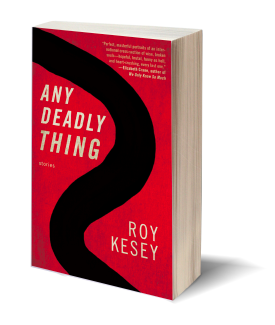
Dzanc Books
250 pages, $15.95
Review by Thomas Michael Duncan
Roy Kesey’s Any Deadly Thing spans more of the globe than any other collection in recent memory. The stories within these pages take place in Peru, Croatia, China, Paraguay, Paris, Louisiana, and much of northern California. A single story touches on Beijing, Guatemala, Mexico, and New York. It’s a departure from the trend of tying a collection of stories together through a common location or region, a decision that allows space for Kesey to demonstrate his versatile command over voice and language.
The collection begins with the story of a troubled, protective single father in the rural town of Fallash. He is a hardened, no nonsense man who works with his hands, and Kesey uses short, choppy sentences in plain English:
“Jay takes the bag, nods at the register girl, runs out to the truck. He gets home and already the dog is sitting up, licking at the air around his daughter’s face. He watches, looks. Haircut could have been worse. Dog’s got no collar but it’s clean, somebody’s for sure but nobody’s from around here close. He boils up the potatoes, fries some venison sausage, lets her feed a little to the dog. The rain stops. An okay day.”
It’s worth mentioning that this “okay day” includes being bitten by his daughter, hard liquor before noon, and hitting the aforementioned dog with his truck. Jay takes on a roofing job for a local pastor whose congregation celebrates mass by exposing themselves to poisonous snake bites. The story unspools a mess of threats to Jay and his girl, justifying his defensiveness and condemning it as foolhardy all at once.
“Body Asking Shadow” follows a very different character in a very different place. Wenyuan, a retired Chinese history professor in Beijing, wants only peace and quiet to write his book. Here Kesey takes on a more sophisticated, academic voice:
“It occurred to him that singing crickets had first become popular as pets during the Tang empire, and perhaps a cricket was exactly the sort of companion he needed, one that would take the edge off the silence without being too much of a distraction, one that might work as a talisman and maybe even sing him into work.”
An American family moves into the apartment upstairs, resulting in the obvious conflict, as most Americans are now keenly aware of our foreign perception as noisy, rude, disruptive, bothersome people. The clatter that carries through Wenyuan’s ceiling is too great for him to work, focus, think, sleep. Up until the end of the story, Wenyuan is the only character to appear “on-stage,” with everyone else presented through his lens of sleep-deprivation. The conflict reaches its climax when the Americans, now evicted, appear inside Wenyuan’s apartment and it becomes clear that their reality is far from Wenyuan’s largely imagined perception of the family.
In some of Kesey’s stories, as with those mentioned above, story is the focus and technique a supporting force. In others, the story becomes awash in directive structure and technical artistry. These pieces read like overwrought demonstrations of the craft and fail to leave any lasting impact. It is the first kind of story that sticks.
In “Probably Somewhere,” a recovering alcoholic named Gerry comes to the rescue of a heavyset woman who breaks an arm when a swing set snaps beneath her weight. The two become involved, but Gerry balks when invited to meet the woman’s young son. Here we see some of Kesey’s most emotionally charged writing.
“That thing about five years wasn’t totally a lie, but there are always times. Once or twice a year, and it lasts a couple of days, or a week, or a month. This is how it goes: you never turn the television off. You call the liquor store, the one that delivers, every other day. And you know there are things out there, big things, but you can’t quite finish your sentences, not even in your head.
I finally wake up sour and don’t want it anymore. The radio says it’s Thursday.”
The rest of the story is told in first-person, but here the perspective jumps to second-person, the way people are apt to do when trying to distance themselves from a situation, and it only jumps back when the bender is over. Gerry’s discomfort is not only apparent in what he admits, but what he leaves unsaid. There is enough for the reader to understand exactly what is going on, but it is too difficult for him to say outright.
No central setting is necessary for Any Deadly Thing to be a cohesive collection. It’s a reminder of the universal dangers we all confront—guilt, temptation, heartbreak. Above all, it’s sharp, quality writing that unifies these stories.
***
Thomas Michael Duncan lives with his wife in Liverpool, NY. His reviews and short fiction can be found at places such as Little Fiction, Prick of the Spindle, and Necessary Fiction. He tweets @ThomasMDuncan.
![[PANK]](https://pankmagazine.com/wp-content/themes/pank/assets/images/pank-logo-large.png)
